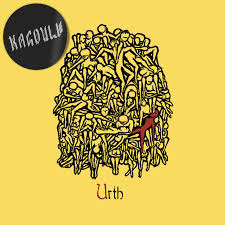For a city whose only notable musical exports up until recently were the likes of Paper Lace and Su Pollard, Nottingham has been spewing out a fair amount of chart botherers over the last couple of years, including the likes of Jake Bugg, Indiana, and Saint Raymond. Away from the glare of the charts, Nottingham has always had a thriving underground music scene. Acts making worthwhile music and on their own terms existing in communities of like-minded people. In the past, bands such as Bob Tilton, Six By Seven and Seachange have put their heads over the parapet to get a whiff of the overground, before hunkering back down. More recently, the success of Sleaford Mods has shown that you can still glean wider acceptance and attention without being forced to take a dump on your own DIY principles.
Kagoule were in the mid-teens and at school when they started to make a noise around their home town of Nottingham. Playing gigs in the city’s toilet venues for DIY promoters, lobbing up a self-produced EP on Bandcamp (which alas no longer exists), it wasn’t long until people started to take notice of their alt. rock racket. This led to support slots outside of the city with bands of a similar aesthetic such as Wytches, Iceage and Drenge. With momentum picking up, last summer saw the band perform a well-received set on the BBC Introducing stage at Glastonbury Festival and sign on the dotted line with the legendary Earache Records.
The label that has put out ferocious noise-makers such as Napalm Death and Bolt Thrower may not immediately appear to be a natural home for a band that could easily slip alongside many of the bands on the Touch And Go roster. But Earache have always had their, er, ears to the ground when it comes to home grown, forward-thinking guitar rock that’s very much of its time and place, and that’s what we have here on Urth.
If, as has been claimed in interviews, the band are keen to distance themselves from lazy associations with grunge, the quiet/loud dynamic of opener ‘Gush’ certainly doesn’t shy away from the genre’s template. But it’s a proven recipe, and when the ‘crunch’ kicks in, it’s with giddy excitement. The band turn this template on its head on ‘Adjust The Way’ and we are faced with pulsating jagged guitars before the song drifts to almost nothing in the wearily sighed choruses.
The band’s ability to invert and manipulate their influences and shape them in to their own thing is one of Kagoule’s main strengths and what raises them above many of their 90s influenced guitar-toting contemporaries. Kagoule are not a straightforward three-piece band, and there’s an underlying weirdness to what they do that makes Urth such an intriguing listen. ‘Damp Sand’ is a prime example of this – vocals that sound as if they were recorded under water burble on top of a circular, angular riff that brings to mind the great Unwound.
Much of the strangeness that seeps through Urth is down to frontman Cai Burns’ lyrics, many of which take inspiration from sci-fi and fantasy literature – this should come as no surprise really considering the record takes its title from the novel The Urth Of The New Sun by Gene Wolfe. The songs are packed full of obtuse analogies used to mirror Burns’ emotions that keep you second guessing and have the ability to throw you off guard. "We had a son, he had no muscles," he sings on ‘Mike’, while ‘Open Mouth’ is full of unsettling imagery as if the song inhabits the world of Twin Peaks.
Urth is rich with melodies and interwoven guitar lines with all sorts of alternative rock references spread throughout. You can hear Siamese Dream-era Smashing Pumpkins within the creamy overdriven tones of ‘It Knows It’, while there are shades of Lungfish amongst the chiming guitars of ‘Greenbeefo’.
If these songs represent the members of Kagoule maturing from school kids to young-adults, bassist Lucy Hatter’s guttural ear-drum slashing scream in the spiky ‘Empty Mug’ is pure undiluted teenage angst. It’s an utterly beautiful thing to hear. Hatter’s input as a vocalist that is Kagoule’s secret weapon here. Her often sweet voice can be heard puncturing Burns’ angsty delivery. She takes over lead vocals shines on ‘Made Of Concrete’, an old song that has been given a make over on Urth.
With a gestation period of almost a year, you may be forgiven for expecting a wall-to-wall guitar overdubs mess littered with endless fiddling and tweaking. Nothing could be further from the truth. What they originally started in a remote studio in Wales in August of last year and then finished in sporadic recording sessions in Sheffield is a killer beast of a record that’s dripping with the afterbirth of its influences. Kagoule have captured the energy, thrills, uncertainties and anxieties of being a teenager and bundled it all up in an exciting debut album that thrills from beginning to end. More importantly they’ve done it on their own terms. Teenage angst has paid off well.
<div class="fb-comments" data-href="http://thequietus.com/articles/18670-kagoule-urth-review” data-width="550">


